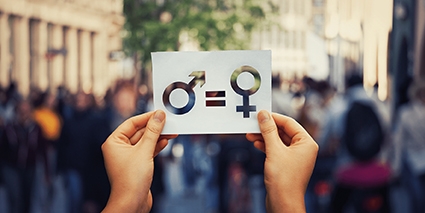PMCG Research: Men Earn 37% More than Women in Georgia
PMCG organization has published an overview on the gender pay gap in Georgia and indicates that, as of 2018, the difference in salaries of men and women is 37% and if the trend does not change, it will take about 30 years to eliminate the existing differences.
The organization says that last year the average salary of a man in Georgia was 1360.5 GEL ($458.53), and the salary of a woman was 856.2 GEL ($288.6), which means a difference of 37.07%.
“Analysis of unequal pay has been possible since 2001, when the pay of women was 49% lower than that of men. Although the absolute difference between the average salaries of the two sexes has been increasing, the percentage difference has been decreasing since 2005,” the survey reads.
It also says that between 2005 and 2013, the pay gap fell from 51.06% to 36.43%, but then increased by half a percent, resulting in today's 37.07%.
“If the above 10-year trend does not change, it will take 30 years to eliminate the wage gap and, according to the statistics of the last five years, the average salaries of men and women cannot become equal,” the organization says.
It was also noted that in 2018, Georgia's potential workforce, 15 years old and up, was 3.034 million people. Women represent 53.6% of this 15+ population, but only 46.6% of the workforce, which means fewer women participate in the workforce than men.
“The level of women's activity has increased from 54.4% to 55.6% since 2010. The main cause of the slight increase may be the decline in population, as the number of women in the labor force has not increased,” says PMCG, adding women’s activity level of 2018, which is 55.6%, is not a satisfactory number, especially when the activity level for men is 73.6%.
It added that this difference can be explained by certain stereotypes, and based on empirical examples it may be argued that the low activity level contributes to the pay gap.
PMCG believes one of the main reasons for the pay gap may be the disproportionate distribution of men and women in different sectors. For example, in the five highest-paid sectors, women exceed men only in one sector, while in the lowest-paid sectors, they are represented as a majority in the top three sectors.
In particular, men are predominant in sectors such as construction and in the electricity, gas, steam and air-conditioning supply sectors. The average wages in these sectors are GEL 1513-1757, making them the fourth and fifth highest paid jobs. For comparison, in the education sector, which is considered the lowest-paid sector, 82% of employees are women.
PMCG says another important factor that also contributes to unequal salaries is the type of activity in the sector. In particular, in the financial and insurance sectors, where the difference between salaries is most noticeable, 74.2% of women work as office staff while only 56.2% of men also do so. In high-paid jobs, such as specialist-professional, the percentage of men is twice that of women.
“Based on the available data, it may be inferred that some of this difference is due to the different working hours of men and women and the different career decisions they make at an early age. Traditions may also greatly influence these decisions,” the organization stated.
In late August, the Women’s Movement in Georgia protested the existing pay gap in the country, saying the difference between men and women’s salaries in Georgia is 36%.
The organization said studies show that high wage differences directly increase the number of economically inactive women and also have a bad impact on child poverty.
“The government must ensure a non-discriminatory wage and labor conditions that will empower women and boost the country's economy,” they said.
The Public Defender of Georgia, Nino Lomjaria, also commented on the issue, confirming that gender equality in labor relations and economic empowerment of women remains a challenge in Georgia, which in turn has a negative impact on women's legal status, including increasing their vulnerability to discrimination and domestic violence.
By Thea Morrison
Image source: australiapostcollectables.com.au












